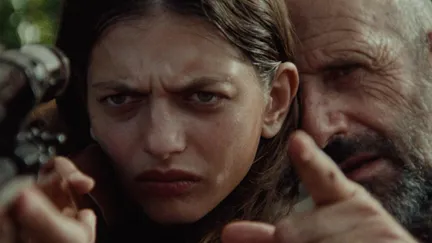In “The Kingdom,” Lesia, portrayed by Ghjuvanna Benedetti, is still daddy’s girl at 15, even though she’s aware of her father Pierre-Paul’s shady dealings. She asks him why people want to kill him, but Pierre-Paul evades the question, emphasizing the dangers of their lifestyle.
Set in the ’90s, the film explores Corsican mob rule, a time when revenge killings were commonplace. Despite years of peace between crime families, a car bomb targeting the president signals the end of the truce. Now, clans vie for control over extortion, drug, and dock rackets, leading to a cycle of violence and revenge.
The story draws from director Julien Colonna’s childhood memories, particularly a fishing trip with his father and uncle where he realized their involvement in larger schemes beyond fishing. Colonna prioritizes authenticity, casting non-actors fluent in the local dialect and capable of convincingly portraying the rugged Corsican lifestyle.
While relying on first-time actors could have been a risk, the performances in “The Kingdom” are robust, delivering a gripping tale of thwarted love and familial conflict. Lesia yearns for a normal life away from violence, but her father’s dangerous pursuits make it impossible.
Despite its thriller elements, “The Kingdom” feels more like epic drama, with Audrey Ismael’s score sustaining tension and the intricate web of clan dynamics keeping the narrative restless. The villa where the clan resides becomes a hub of activity, with Lesia navigating the perilous world of tough men and familial intrigue.
The Corsican landscape serves as both backdrop and contradiction to the story’s brutality, captured in stunning cinematography that contrasts sun-drenched vistas with the shadowy underbelly of crime. Colonna embraces the beauty of Corsica, adding depth to the film’s exploration of familial bonds and tragedy.
As Lesia grapples with her father’s choices, the film delves into themes of fate and loyalty, evoking a sense of classical tragedy. Despite the violence and turmoil, Lesia never blames her father, recognizing the inevitability of their circumstances.
“The Kingdom” is not just a mafia thriller; it’s a poignant exploration of family, loyalty, and the complexities of human nature. Through Lesia’s eyes, audiences witness the harsh realities of life in the Corsican underworld, where survival often comes at a steep price.
With its rich storytelling, compelling performances, and breathtaking cinematography, “The Kingdom” stands out as a powerful cinematic experience that transcends the conventions of its genre. It’s a testament to the enduring allure of familial bonds and the tragedies that often accompany them.
Overall, “The Kingdom” offers a nuanced portrayal of crime and its impact on individuals and families, leaving a lasting impression on audiences long after the credits roll.
In “The Kingdom,” Lesia, portrayed by Ghjuvanna Benedetti, is depicted as still being daddy’s girl despite her father Pierre-Paul’s involvement in illicit activities. She’s at an age where she’s starting to question the world around her, including the dangerous circumstances her family operates in. When she asks her father why people want to kill him, Pierre-Paul, perhaps out of a desire to shield her from the grim realities, evades the question, highlighting the inherent dangers of their lifestyle. This dynamic sets the stage for the complex exploration of familial bonds and underworld intrigue that unfolds throughout the film.
Set in the tumultuous ’90s, “The Kingdom” offers a glimpse into Corsican mob rule during a time when revenge killings were rampant. Despite a temporary peace between rival crime families, the detonation of a car bomb aimed at the president signals an end to the truce. With various clans now vying for dominance in the underworld, the narrative becomes a gripping tale of power struggles, betrayals, and the relentless pursuit of control over lucrative criminal enterprises such as extortion, drug trafficking, and control of the docks.
Director Julien Colonna draws inspiration from his own childhood experiences, particularly a fishing trip with his father and uncle, where he first became aware of the larger, more clandestine activities taking place beneath the surface of everyday life in Corsica. This personal connection lends authenticity to the film, as Colonna seeks to capture the essence of Corsican culture and the complexities of its criminal underworld.
Despite the risks involved in casting non-professional actors, the performances in “The Kingdom” are laudable, bringing depth and authenticity to the characters. Benedetti’s portrayal of Lesia, in particular, is compelling as she grapples with the dual desires for normalcy and loyalty to her family amidst the chaos and violence that surrounds her.
If you like the article please follow on THE UBJ.
